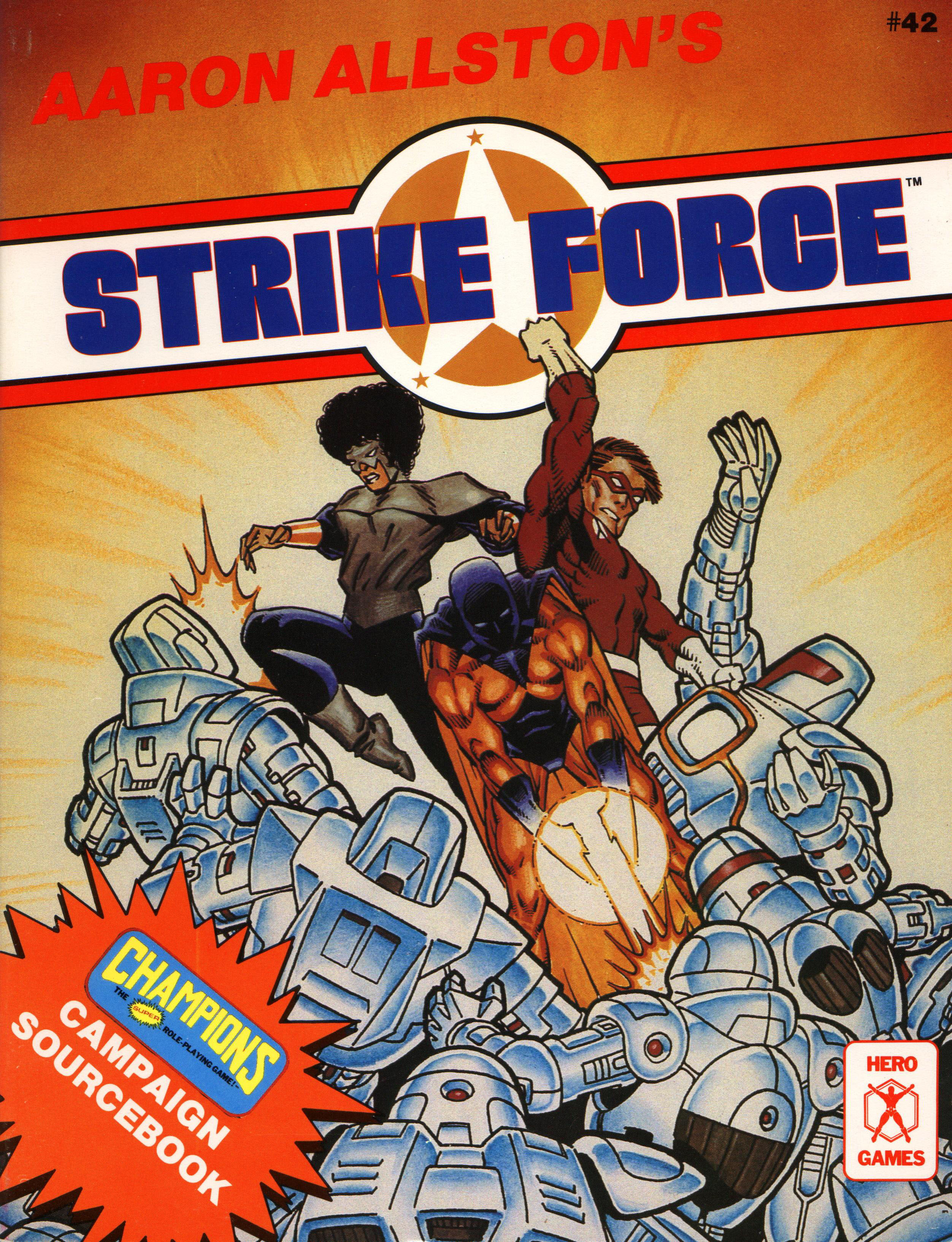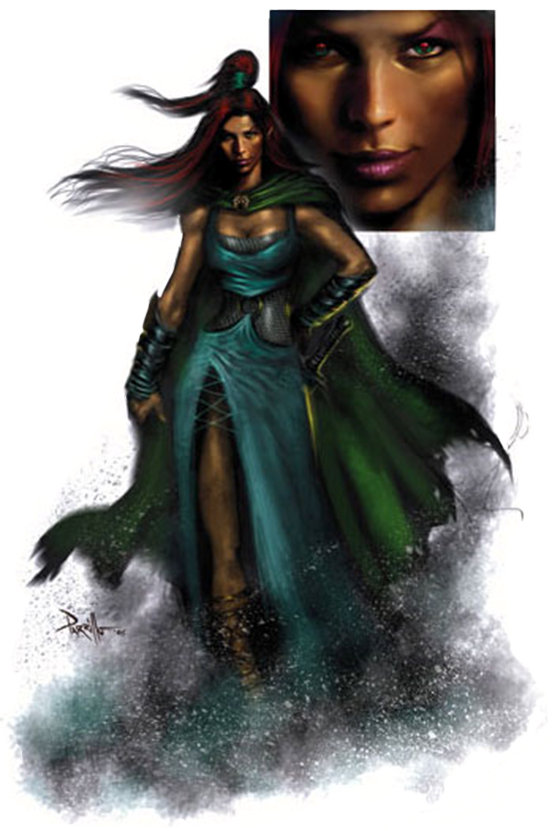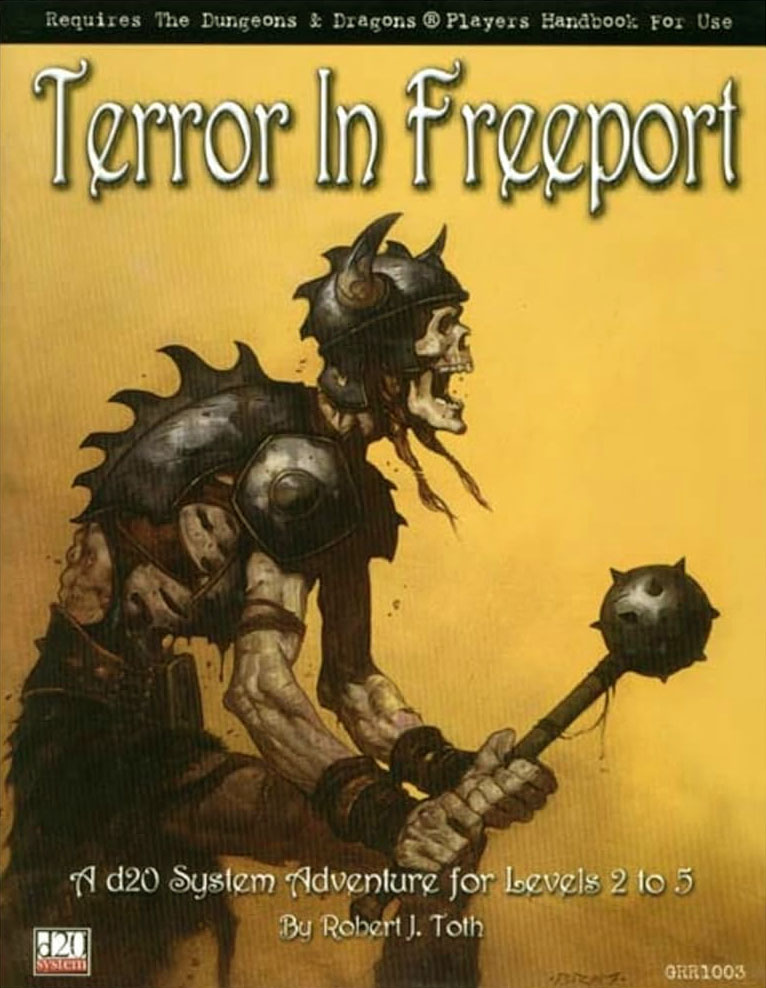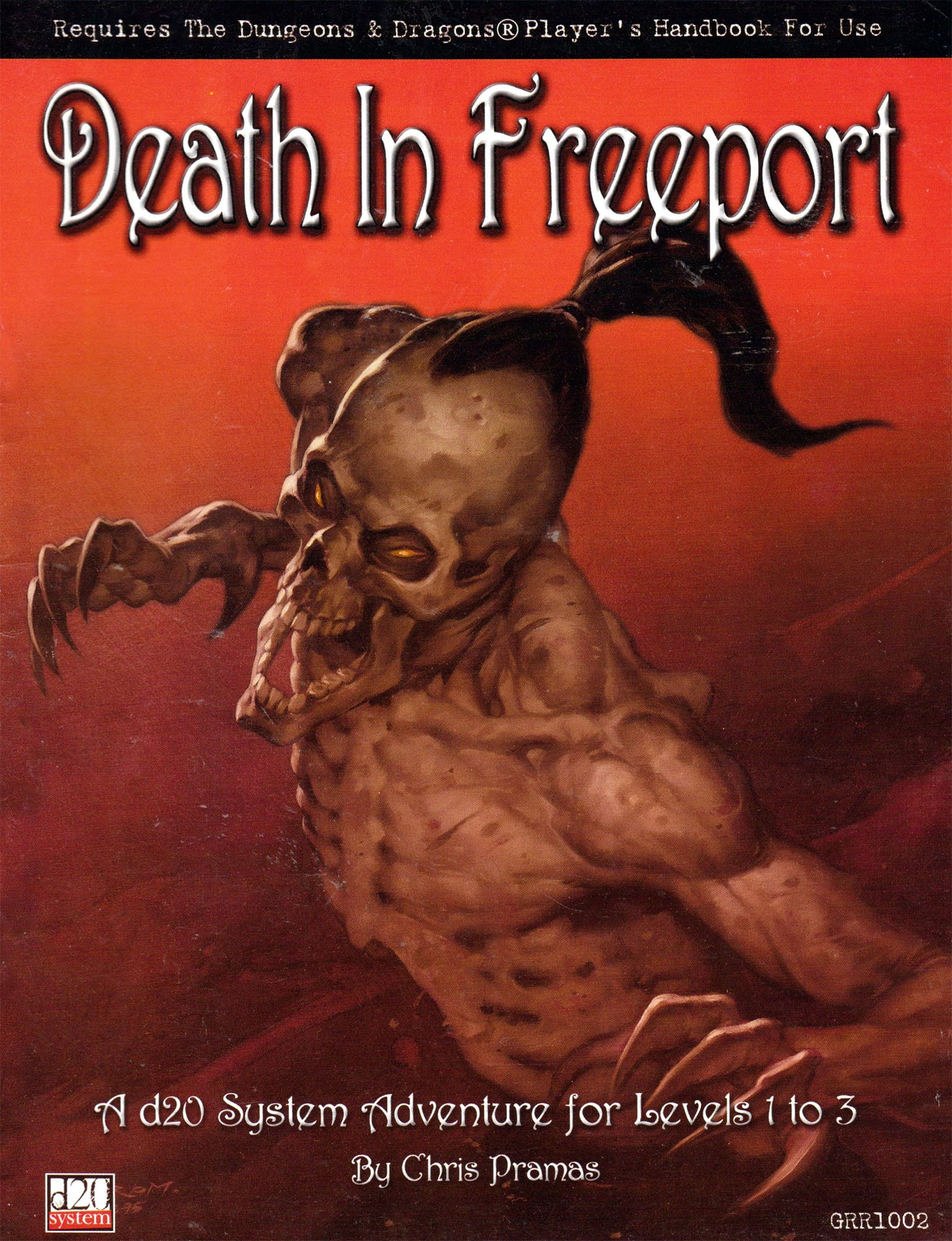
So I’m revisiting Aaron Allston’s Strike Force, the legendary campaign supplement for the Champions roleplaying game, and he’s talking about the PCs’ Hunted. But he’s talking about it in a really weird way: As if obviously every PC is going to have a Hunter. He’s built it into his character creation checklists. It’s baked into his campaign planning.
If you’re not familiar with Champions, let me explain a little bit: It’s a superhero RPG which would later grow to become the generic Hero System. It’s one of the earliest point-buy character systems, in which players are given a budget of points and can use them to buy various abilities, skills, and powers. There are also disadvantages: weaknesses players can pick for their character to give themselves more points to spend on stuff.
One of these disadvantages is Hunted, which means that there’s someone or an entire group of people hunting the PC. But, as I say, it’s just one character option among many. So why was Allston writing not only as if every PC would have this specific disadvantage, but that this would be self-evident to the reader?
My introduction to Champions came through a review of the 4th Edition of the game in Dragon Magazine, and I later scooped up a copy of the same edition at my local gaming store. Although I was never been able to play or run it as much as I would’ve liked, I immediately loved it and it had a major influence on me as a gamer.
Allston’s Strike Force campaign, on the other hand, didn’t use 4th Edition. It started as a 1st Edition campaign when the game first came out. So I went back to 1st Edition to see if I could figure it out.
What I found is that Hunted hadn’t actually changed much. In fact, it still hasn’t in the current 6th Edition of the game. But the difference was that, by 4th Edition, the Champions rulebook was almost 400 pages long. For me, Hunted was just one pebble on a very large beach.
The 1st Edition of Champions, on the other hand, was only 56 pages long. So for Allston — and, I suspect other Champions GMs of that era — Hunted had a much more prominent position. Both the  GMs and the players were much more aware of it, and the result was that it become somewhat central to how Allston ran the game. (I’ve also talked about this kind of mechanical “spotlight” that can emerge in barebones systems in Reactions to OD&D: The Influence of Little Rules.)
GMs and the players were much more aware of it, and the result was that it become somewhat central to how Allston ran the game. (I’ve also talked about this kind of mechanical “spotlight” that can emerge in barebones systems in Reactions to OD&D: The Influence of Little Rules.)
In Strike Force, Allston talks about how a GM can/should:
- Check during character creation to make sure you know how a Hunter will be used.
- Use Hunters to pace character arcs and set up campaign finales.
- Age Hunters by combining them, resolving and replacing them, evolving them, or creating spinoffs.
- Incorporate the Hunters from new PCs into a campaign.
It quickly became clear to me that this concept of being Hunted was something that could easily inject interest into almost any campaign, regardless of what RPG you were running. This idea was really the seed that eventually grew into the entire Session 0 Modules series.
HUNTED
During Session 0, ask the players to define their Hunter. This can be done either individually (so that each PC is being hunted by a different Hunter) or as a group (with a single Hunter pursuing all the PCs and/or the organization the PCs belong to). A mixed approach is also possible, with perhaps two or three PCs all being pursued by mysterious organization whose agents wear rose-tinted glasses, while another PC could have an NPC rival serving as their Hunter.
Option: In the spirit of the original disadvantage, you could instead offer Hunted as an option to the players in exchange for some boon or benefit. (Maybe if they choose to be Hunted, they gain a powerful Ally. Or a powerful artifact. Maybe it’s actually the artifact that the Hunter is seeking?)
CREATING THE HUNTER
If the players have a strong vision of their Hunter spring full-blown from their brow, that’s fantastic. They should write down every awesome idea that they have. But whether you’re looking to brainstorm a new idea or fleshing out an inspired one, you can use this semi-formal cycle of question-and-response to develop the Hunter.
GM: Who is the Hunter and why are they hunting you? (Player responds.)
Player: How often does the Hunter hound me? (GM responds.)
GM: What do you think is the most frightening or dangerous aspect of the Hunter? (Player responds.)
Player: What weaknesses does the Hunter have, if any? (GM responds.)
GM: When you think of the Hunter, what is your most powerful memory of them? (Player responds.)
GM: Who is the Hunter and why are they hunting you?
The GM will ask this question and the players should answer it. If you’re the players, you don’t need to produce a full dossier here. You just need to sketch in a broad concept.
If multiple characters are being pursued by the same Hunter, then the players should all have a part in answering the question. The GM can help them all have a creative stake in their Hunter by spreading some or all of these supporting questions around the table:
- What do they want from you?
- When did they first start hunting you?
- What’s their modus operandi? How do they threaten you?
- Why haven’t you been able to escape their pursuit?
- What do they look like?
The term Hunted lends itself to characters like Kraven the Hunter or the Black Riders from Lord of the Rings — i.e., characters who are literally hunting the PCs and want to kill them (or worse). But the stakes don’t have to be life-or-death. For example, being pursued by authorities who want to arrest them — like U.S. Marhsal Samuel Gerard from The Fugitive or Boss Hogg from The Dukes of Hazzard — are often a good fit. It can also include rivals like Gary Oak from Pokemon or someone obsessively pursuing the PC romantically like Lwaxana Troi from Star Trek. J. Jonah Jameson’s antagonism towards Spider-Man is another good example.
The important thing is that the Hunter makes things difficult for the PCs and/or impels them to take action (regardless of whether that action is fight or flight).
If it’s appropriate for the campaign, you might even be able to make the Hunter more abstract. Maybe there’s some strange plague that haunts the PCs’ footsteps, for example. Or the Nothing from The Neverending Story.
If the Hunter is an organization, however, consider giving that organization a “face” — an NPC who is most likely leading the efforts to hunt down the PCs. This NPC might not be present every time the organization show up, but they show up often enough that the PCs can form a personal relationship and antagonism with them. Think about Agent Smith is the face of the Agents from The Matrix, for example, or Prince Zuko’s role as the face of the Fire Nation in Avatar: The Last Airbender.
Player: How often does the Hunter hound me?
Will every session of the campaign be like an episode of The Fugitive TV show, with the only question being when — not if! — the Hunter will show up? Will they show up to complicate things every few adventures? Or are they more of a looming threat that will only show up (with likely catastrophic intensity) once in a blue moon or at major turning points in the campaign?
See “Triggering the Hunter,” below, for more details on Hunter frequency. Setting this frequency will be partly about what effect you want the Hunter to have on gameplay and partly about how interesting you think the Hunter and/or the threat of the Hunter will be to the narrative of the campaign.
(If you don’t think the Hunter is interesting at all, that may be a sign that you should veto the Hunter and try to come up with a new one that everyone is interested in.)
GM: What do you think is the most frightening or dangerous aspect of the Hunter?
The answer to this question may be emphasizing an established characteristic of the Hunter, but this is also an opportunity to raise the stakes by adding some new and terrible facet to the Hunter: Yes, the FBI is chasing us, but did you also know that Agent Keighley is secretly a werewolf?
If multiple players are being pursued by the same Hunter, have each of them give a separate answer. Ideally, each of them will come up with some new addition to the Hunter’s danger, but it’s okay if they both fear the same aspect of the Hunter, as long as they can give it a new twist or explain why it particularly resonates with their character. (Or both.)
If you’re struggling to think of an aspect, you might consider:
- Unique technology the Hunter possesses
- A supernatural ability
- Official authority and/or pervasiveness in the campaign world
- The minions they control
- What makes them so hard to kill
- How they threaten to transform/ruin/remake the PC
Player: What weaknesses does the Hunter have, if any?
Werewolves are vulnerable to silver. FBI agents can only directly pursue you in the United States. Prince Zuko’s ship is slower than the Avatar’s flying bison. The PCs have a double agent in the Hunter’s ranks. The Hunter doesn’t know the PCs’ true identities. After unleashing their Cerulean Minions, they have to recharge their lunar batteries in the light of the full moon.
Whatever the weakness may be, it should give the PCs a meaningful edge, loophole, or leverage against the Hunter. This also means that the more powerful or all-encompassing the Hunter is, the more significant the weakness should be. (On the other hand, the Hunter’s weaknesses probably shouldn’t turn them into a joke, either.)
Tip: If, during the course of the campaign, the Hunter manages to neutralize their weakness, this will likely make them FAR more dangerous to the PCs. This means revealing their plans to do so can be a VERY effective scenario hook: Give the PCs a chance to make sure their identities remain hidden; prevent the satellite network from neutralizing kryptonite worldwide; stop the ritual that will allow Agent Keighley to turn into her werewolf form any time she wants to. If they succeed? Great. If they fail? Have their Hunter push them to the edge.
GM: When you think of the Hunter, what is your most powerful memory of them?
Try to make this memory something specific. It should be a distinct, concrete event — maybe a fleeting moment (e.g., when Agent Smith caused your mouth to disappear); maybe a prolonged incident (e.g., the Texas Affair); but not simply a general impression.
Here are some supporting questions you might use if you’re having difficulty brainstorming a memory:
- When did you first learn that you were being hunted?
- What’s a time when the Hunter injured you?
- How has the Hunter affected the other people in your life?
- What major life event was ruined by the arrival of the Hunter?
- When did you receive a warning or realize something was wrong, giving you just enough time to slip out of the Hunter’s grasp?
- How has the Hunter scarred you?
Your primary goal here is to weave the Hunter into your character background, but you may also discover something new about the Hunter or add lore to them as you’re fleshing out this memory. That’s just fine. Ideal, even.
Option: If you’re creating a Hunter who will only be introduced after the campaign has begun — as part of the first session, for example — then simply skip this question.
TRIGGERING THE HUNTER
Hunters should, of course, show up during the campaign. They are, after all, pursuing the PCs.
In some cases, you might have an entire scenario dedicated to dealing with the Hunter when they show up, but it’s usually more effective to add the Hunter as a complication to other scenarios:
- The PCs need to find the Ruby of the North in the Labyrinths of Omarrat, but now the Blightborn have entered the dungeon, too, and are trying to track them down.
- Melissa has been kidnapped by the Mystic Triad and the PCs need to save her! What a terrible time for Quartz to show up and pick a fight!
- The Maltese Falcon has appeared in Hong Kong in a 1980’s pop-up juncture and now the PCs, the Eaters of the Lotus, and all four of the Four Monarchs have teams scrambling to nab it for themselves. Of course Gorok the Cyber Ape, who has been hounding the PCs for months, is getting in on the act!
Procedural Check: Instead of or in addition to arbitrarily deciding when the Hunter will show up, you can make a check once per session or once per scenario. Think about how often you want the  Hunter to appear and set the odds of the check accordingly.
Hunter to appear and set the odds of the check accordingly.
If the group have three or more Hunters, I recommend having a 1 in 1d6 chance to trigger the Hunter.
If the group only has a single Hunter, I recommend using a 2 in 1d6 or 3 in 1d6 chance.
Having the Hunter show up as a procedural element in the campaign is fun because (a) it provides you with a cool creative prompt and (b) it can really enhance the feeling of the Hunter adding complication to an existing situation. Keep in mind that a Hunter’s presence doesn’t have to hog the spotlight: It might even be entirely incidental (a letter from a PC’s friend mentions strange men asking questions at their old school; they see Quartz fighting a different superhero on the TV news; etc.).
Of course, if circumstances dictate that the Hunter couldn’t possibly show up at this particular point in time (e.g., the PCs have been teleported to the far side of the galaxy by the Neutron Crystal) or vice versa, then you can obviously ignore this check.
Design Note: The Hunted disadvantage in Champions defaults to a roll of 8 or lower on 3d6, but a player could increase this target number to 11 or 14, causing the Hunter to appear more frequently (but also earning them more points to spend in exchange).
The Omnipresent Hunter: Hunters will generally be a light spice for the campaign, but in some cases you may find them so compelling — or so overwhelming in their scope — that the whole campaign becomes about them. As an extreme example, consider the players proposing that their Hunter is a zombie plague which is slowly spreading across the land, with the inevitable conclusion that the campaign will turn into The Walking Dead.
If that sounds like an awesome campaign to you… well, fantastic! Leap at the opportunity! You’re never going to have players more invested in a campaign than that.
But if you, or the other players, aren’t okay with a Hunter dominating and/or defining the campaign like that, then you’ll need to either veto that Hunter or figure out a way to alter the Hunter to figure out a different path forward.
EVOLVING & RESOLVING THE HUNTER
Hunters, and the characters’ relationships with the Hunters, should ideally evolve over time: Yes, Lieutenant Gerard showed up at the end of every episode of The Fugitive and the Joker always pops back up with a new scheme to challenge the Batman, but even those characters have had their stories brough to a conclusion. (Even if they come back again the next time the franchise reboots.)
Escalation: If the PCs feel as if they have their Hunter under control or that the Hunter is no longer posing a threat, you can find a way to escalate the danger they pose. For example, a vampire shows up with a coterie of newly turned husbands in tow; Agent Keighley reveals that she’s a werewolf for the first time; the lich-king obtains the Crown of Sizzerak; the FBI puts the PCs on their Most Wanted list and now there’s a larger task force assigned to their case, plus they’re being recognized and reported by people on the street.
Combination. If the PCs have multiple Hunters, a specific form of escalation can be for their Hunters to team up. You might also reveal that these Hunters have always been working together, possibly as part of a larger organization. For example, Spider-Man’s foes team up as the Sinister Six; the Fey Queen who has been pursuing the PCs imbues their other Hunters with faerie magick to form a Wild Hunt; or it’s revealed that the Sith and the Trade Federation have been working together this whole time.
Defeat. Perhaps the most natural resolution for a Hunter is their defeat: The PCs track down and kill the Man in the Silver Mask whose mercurials have been hounding them. Or they reveal General Lee’s crimes and watch him get hauled off in handcuffs.
If the Hunter is connected to a character, then the defeat of their Hunter is likely a major part of their story arc or even its conclusion. So you’ll want that to either line up with the end of the campaign or, in a more episode campaign, be prepared for that character to either retire or start a whole new arc.
If the Hunter is pursuing the whole group, then the same thing but even moreso.
Changing the Face. If PCs are being hunted by an organization, they can enjoy a measure of success by defeating the Face that’s been pursuing them. But even with the Face gone, of course, the rest of the organization can reorganize and redouble their pursuit.
Generally speaking, it’s a good idea to give the PCs a respite from their Hunters as a reward for the setback they’ve inflicted. But when the Hunters come back, you’ll likely want to escalate their threat and definitely set up a new Face for the PCs to build a relationship with. It’s best to not just retread the narrative beats the PCs have already experienced, though, so try to find some way of raising the stakes, letting the PCs get closer to a final victory over their adversaries, or transforming the nature of the threat posted by the Hunters.
Tip: As a variant here, you might introduce a brand new Hunter … only to reveal later that it’s actually the SAME Hunters with a new M.O.!
Spin-Off. Another variant here is that, after a Hunter’s defeat, the PCs might be confronted a spin-off Hunter: They kill Dracula only to discover that his wives are seeking revenge; a criminal discovers a cache of supplies left behind by the Hunter the PCs sent to prison and emerges as a new supervillain; or they discover that defeating one Predator only means that you’ve been identified as an even more desirable prey.
Success. Of course, it’s also possible that the Hunter succeeds: They kill the PC they wanted to kill; they steal the magical artifact the party was trying to protect; they arrest the PCs in a massive sting operation and lock them up in prison. This is definitely a subversion of expectations, but when we play to find out in RPGs, that happens all the time.
If the Hunter’s success takes the form of death, that’s pretty final. (Although not always, of course.) But other Hunter success stories may just post massive setbacks for the PCs or turning points in the campaign (e.g., I guess this game is about breaking out of prison now). Or maybe not: A tragic ending can be just as satisfying as a happy one.
Heel-Face Turn. For a more positive conclusion, maybe the Hunter switches sides. That might be a supervillain inspired by their PCs’ example and wanting to help the world with their powers or a dedicated U.S. Marshal who realizes the fugitive they’re pursuing has been wrongly accused.
Alternatively, maybe only the Face of the Hunter organization might perform the Heel-Face Turn, becoming an ally of the PCs in their fight against the rest of their organization. (This can be a great replacement character for a PC who’s died or a cool role for a new player to step into.)
Back to Session 0 Modules

 “I know not who you are! Or why you have come! But none shall disturb my house!”
“I know not who you are! Or why you have come! But none shall disturb my house!”
















